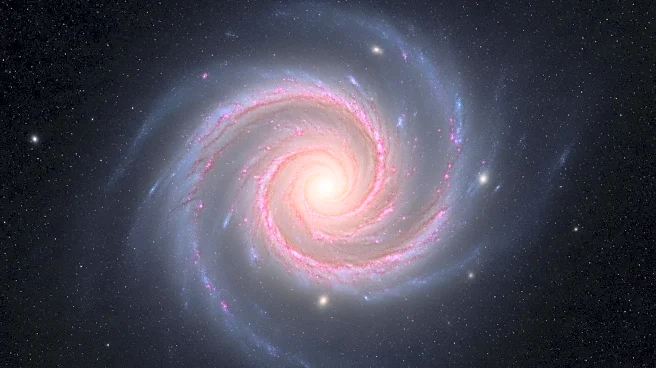What is the story about?
What's Happening?
Recent observations by the James Webb Space Telescope have uncovered a pattern in the rotational direction of galaxies, with approximately 60% of ancient galaxies rotating clockwise. This discovery challenges previous beliefs about cosmic randomness and has led to a bold hypothesis that our universe might be encapsulated within a massive black hole. The gravitational influence of such a black hole could be dictating the observed rotational behavior of galaxies, prompting a reevaluation of established cosmological models. This hypothesis suggests that fundamental principles like time and matter distribution might operate differently within the unique environment of a black hole.
Why It's Important?
The implications of this discovery are profound, potentially redefining our understanding of cosmology and the fundamental laws governing the universe. If validated, the hypothesis that the universe resides within a black hole would challenge existing theories about the universe's origins, structure, and destiny. It would necessitate the development of new models to describe cosmic behavior within this framework. This revelation prompts a deeper investigation into cosmic forces, potentially altering our understanding of galactic formation and evolution. The findings underscore the necessity of ongoing exploration and observation of the cosmos, driving the scientific community to push the boundaries of knowledge.
What's Next?
Further investigation is required to validate the black hole hypothesis and explore alternative explanations for the observed galactic rotations. Researchers must consider the impact of observational bias, such as the Doppler effect, which can alter the perceived motion of galaxies. Addressing these biases is crucial for ensuring the accuracy of future research and validating the current study's claims. As telescopes like the James Webb Space Telescope enhance their capabilities, scientists stand on the brink of potentially transformative insights into the universe's mysteries, urging a reconsideration of our place in the cosmos.
Beyond the Headlines
The idea of a universe governed by black hole dynamics is both revolutionary and provocative, urging scientists to explore beyond traditional cosmological boundaries. This hypothesis opens new avenues for understanding the universe's nature and its ultimate fate, challenging the notion of randomness in galactic behavior and suggesting a more structured universe than previously imagined. The potential for observational biases serves as a reminder of the complexities faced in the pursuit of cosmic knowledge and the importance of refining observational techniques.
















